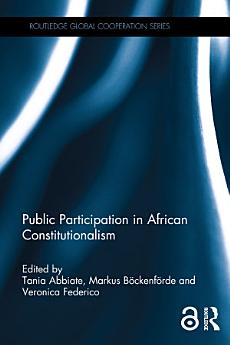Public Participation in African Constitutionalism
About this ebook
This book aims to provide a systematic overview of participation forms and mechanisms across Africa, and a critical understanding of the impact of public participation in constitution-making processes, digging beneath the rhetoric of public participation as being at the heart of any successful transition towards democracy and constitutionalism. Using case studies from Central African Republic, Egypt, Kenya, Libya, Malawi, Morocco, Senegal, Somalia, South Africa, South Sudan, Tanzania, Tunisia, Zambia and Zimbabwe, the book investigates various aspects of participatory constitution making: from conception, to processes, and specific contents that trigger ambivalent dynamics in such processes. The abstract glorification of public participation is questioned as theoretical and empirical perspectives are used to explain what public participation does in concrete terms and to identify what lessons might be drawn from those experiences.
This is a valuable resource for academics, researchers and students with an interest in politics and constitution building in Africa, as well as experts working in national offices, international organizations or in national and international NGOs.
About the author
Tania Abbiate is a Senior Researcher at the Max Planck Institute for Social Law and Social Policy, Germany.
Markus Böckenförde is Executive Director and Senior Researcher at the Centre for Global Cooperation Research, Duisburg, Germany, and a Visiting Professor at the Central European University (CEU), Budapest, Hungary.
Veronica Federico is Researcher of Comparative Public Law in the Department of Legal Studies at the University of Florence, Italy.




